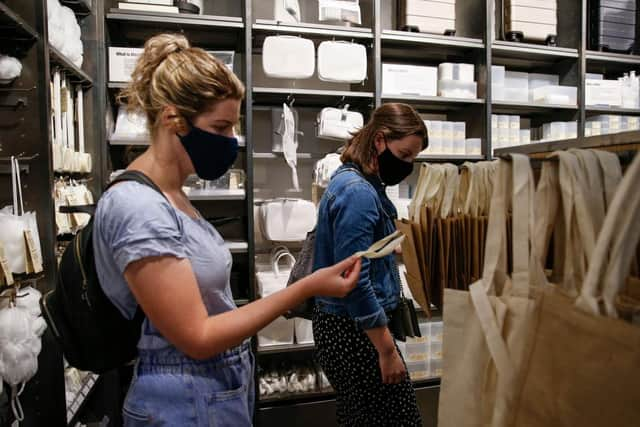All the people who DON'T have to wear face coverings in shops and supermarkets from July 24
and live on Freeview channel 276
Michael Gove said over the weekend that the public could be trusted to use their "common sense" in choosing whether to cover their nose and mouth, but now the Government has changed its stance.
Here is what you need to know about the new rules.


- When does the law come into force?
Advertisement
Hide AdAdvertisement
Hide AdAs of July 24, you must have your nose and mouth covered when you go shopping or risk a £100 fine - reduced to £50 if it is paid within 14 days.
It will be up to police to dish out penalties and not business owners or shop workers, although they are being asked to encourage customers to comply.
The regulations will be made under the Public Health (Control of Disease) Act 1984.
- Why are we being told to wear face coverings almost four months after we went into lockdown?
Advertisement
Hide AdAdvertisement
Hide AdThe Government has been reluctant to enforce the wearing of face coverings, and its guidance states they do not protect the wearer but may protect others if people are infected but have not yet developed symptoms.
Some of the Government's most senior advisers have warned that face coverings can give people a false sense of security and lead to over-reliance on "ineffective homemade masks" rather than thorough hand hygiene.
The Scientific Advisory Group for Emergencies (Sage) says incorrect use of coverings - such as putting them on incorrectly, touching the face more than normal and reusing dirty ones - could increase the spread of infection.
- What can I use as a face covering?
Face coverings are not the same as face masks. The Government has said coverings can be made from scarves, bandanas or other fabric items, as long as they cover the mouth and nose.
Advertisement
Hide AdAdvertisement
Hide AdDozens of YouTube tutorials will talk you through fashioning your own, while official advice says face coverings should allow the wearer to breathe comfortably and be tied behind the head to provide a "snug fit".
- What about surgical face masks and visors?
The public have been asked not to use medical-grade personal protective equipment (PPE) masks to ensure these remain available for frontline healthcare workers.
- Does everyone have to wear a face covering in public in England now?
There are a few exceptions to the new rules about face coverings in shops - children under 11 and people with certain disabilities and breathing conditions will be exempt.
Advertisement
Hide AdAdvertisement
Hide AdIt adds to the list of places we have to be covered up which currently includes all public transport as well as all hospital visitors and outpatients in England.
Official guidance says people in England should also wear a face covering in enclosed public spaces where social distancing is not possible.
- What are the rules for the rest of the UK?
Scotland was ahead of England on face coverings, making them compulsory in shops from July 10 and on public transport from June 22.
Northern Ireland made face coverings mandatory on public transport on July 10, but has yet to make a final decision on shops.
Advertisement
Hide AdAdvertisement
Hide AdFace coverings are advised in Wales in situations "where social distancing is not possible", and on Monday the Welsh Government announced they would be obligatory on public transport from July 27.
Unlike the UK Government and other devolved administrations, Wales has specified any face covering should be made up of three layers of cloth to meet the standard set by regulations.
- If I develop Covid-19 symptoms, can I still go out if I wear a mask or covering?
No. People with symptoms and their household should isolate at home.
- What has the World Health Organisation said?
Advertisement
Hide AdAdvertisement
Hide AdThe WHO also advises a three-layer face covering in the community - the outer layer should be water resistant, the inner should be water absorbent and the mid layer acts as a filter.
It emphasises that a mask alone cannot protect you from Covid-19, and that it must be combined with social distancing of at least a metre and regular hand washing.